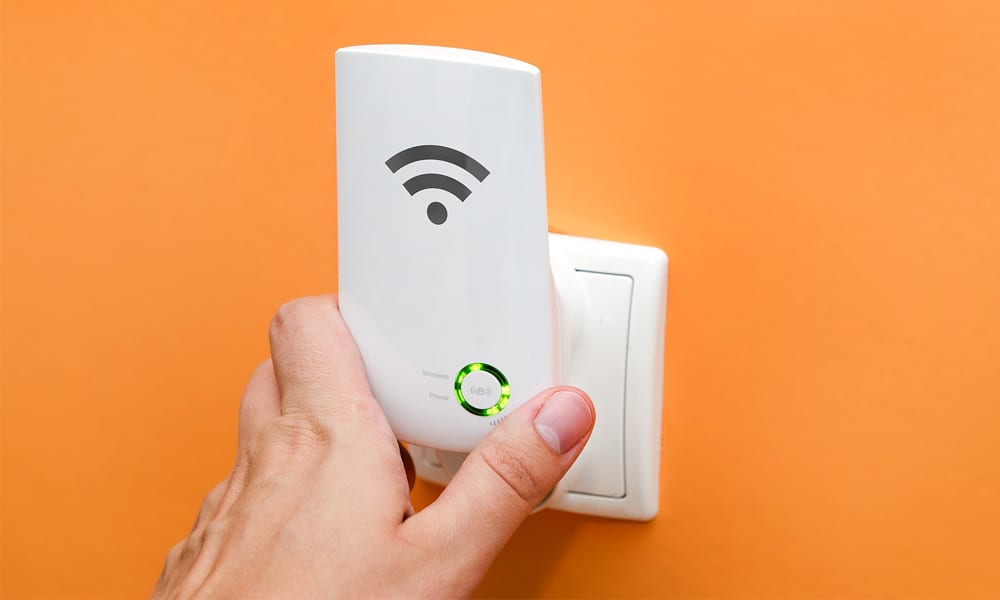If you’re having trouble getting a strong WiFi signal in parts of your home, one of the best things you can do is to install a WiFi extender or a WiFi repeater. Both of these devices are designed to boost your WiFi signal. However, they each do this in completely different ways. Here’s everything you need to know about the difference between a WiFi extender Vs a WiFi repeater, and which one you should choose.
WiFi Repeater VS WiFi Extender
WiFi repeaters and WiFi extenders both improve your WiFi signal and range, however, they do it in different ways. A WiFi extender connects directly to your router and creates a new WiFi network. A WiFi repeater connects to your network wirelessly and rebroadcasts your existing network signal.
(Image Source: Amazon)
If you’re having problems with WiFi “dead zones” in your home, check out our tips and tricks on ways to boost your WiFi signal.
What is a WiFi Repeater?
A WiFi repeater is a type of network booster that expands the range of your WiFi signal. It has antennas that receive a WiFi signal from your router, just like your smartphone or laptop. Then it rebroadcasts that signal over a wider area.
While a WiFi repeater will expand the range of your WiFi signal, it will also make your WiFi signal weaker. Since a WiFi repeater creates a new network that you have to connect to, it will reduce your network’s bandwidth by 50%. That means your devices might be slower, especially if you are streaming or transferring large files over your network.
Most WiFi repeaters simply plug into an outlet, however, you need to place it in a location that already has a WiFi signal. If you put a WiFi repeater in an area with a weak WiFi connection, it will only be able to rebroadcast that signal at half the strength.
Since WiFi repeaters are wireless, your WiFi signal will also be weakened by thick walls, microwaves, metal objects, and electronic devices that are in between your router and WiFi repeater. So, WiFi repeaters are not great for boosting your WiFi signal over long distances or in large homes or offices, especially if there is more than one floor.
You might want to get a WiFi repeater if your garage doesn’t get a strong WIFi signal. Then you can plug the repeater somewhere in between your garage and router. This will allow you to install a smart garage door opener and connect it to the 2nd WiFi network that the repeater creates.
What is a WiFi Extender?
A WiFi extender is a type of WiFi booster that extends your main router’s internet signal to another location. It connects to your home network via an Ethernet cable or coaxial cable. Basically, it’s like adding another router to any WiFi “dead zone” in your home.
Because a WiFi extender uses a wired connection, it does not reduce your bandwidth or get weaker from thick walls or radio waves like a WiFi repeater does. Also, you will not need to sign in to different WiFi networks with an extender.
Since it uses a wired connection, a WiFi extender is a good option for “dead zones” or areas in your home that receive zero internet signal. However, WiFi extenders are usually more expensive and complicated to set up than WiFi repeaters.
A WiFi repeater might not give you good connectivity in a basement game room because of the thick floor. But with a wired WiFi extender, you will be able to go online in the basement without any issues because interference will not be a problem.
What is a WiFi Booster?
A WiFi booster is a general term for both WiFi repeaters and WiFi extenders. Since both devices boost your network’s signal, you will see WiFi repeaters and WiFi extender called WiFi boosters.
What WiFi Booster Should You Get for Your Home?
If you want to expand the range of your WiFi network to a few rooms, you might want to get a WiFi repeater. However, if you want to extend your WiFi signal to a distant location, you might want to get a WiFi extender. There are also lots of devices that work as both repeaters and extenders.
If you’re looking for ways to get rid of WiFi dead zones, check out our list of the best mesh WiFi systems.
HelloTech editors choose the products and services we write about. When you buy through our links, we may earn a commission.




